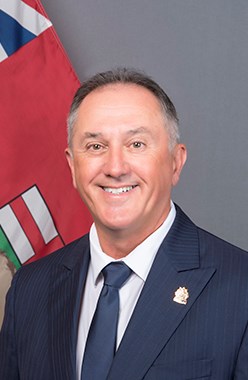Observing that newly appointed Indigenous Reconciliation and Northern Relations Minister Alan Lagimodiere didn’t have a great start as a member of cabinet is sort of like noticing that the Titanic didn’t have a flawless maiden voyage.
Much in the way that a ship’s basic purpose is to get from one harbour to another without ending up on the ocean floor, it probably would have been better for the government if Lagimodiere, who is Métis, had avoided antagonizing representatives of the population he’s supposed to be advancing reconciliation with during his very first opportunity to speak as minister.
The new minister, during a press conference immediately following the appointment and swearing-in of himself and another new minister, said residential schools were intended to teach Indigenous children new skills, which prompted NDP Opposition leader Wab Kinew, who is Indigenous, to interrupt Lagimodiere’s remarks and challenge what he had said.
In layman’s terms, the new minister did something that starts with S to the bed, and the verb in question is not “sleep in.”
By the second day in charge of the Indigenous reconciliation portfolio, previously knows as Indigenous and northern relations, Lagimodiere had issued an official apology.
On the bright side, the only way from this point is up.
Indigenous leaders might have been more forgiving to the new minister if not for the way that he found himself in his portfolio. Premier Brian Pallister had already raised the ire of many earlier this month when he criticized people who had torn down statues in Winnipeg on Canada Day by saying that settlers who came to Canada wanted to build rather than destroy, comments that many Indigenous leaders said minimized the effects of colonization. These remarks also led to Eileen Clarke, who had been in cabinet since the Progressive Conservatives first formed government in 2016, to resign as minister, saying many Manitobans are disappointed with their representatives and that she and other cabinet ministers had not been listened to. Although she was part of a government that has often been at odds with Indigenous people and leaders, Clarke was apparently respected by those she worked with.
In other words, relations between Indigenous leaders and the provincial government, which have often been rocky, were already heading downhill before Lagimodiere put his foot in his mouth. Antagonizing the people you’re intended to be working with within moments of taking on a new job is never a good idea, particularly when that job is to reconcile with people who have been repeatedly mistreated, abused and harmed since Canada became a country in 1867 and before.
In case the government forgot, people are tearing down statues, the most banal and unremarkable features of the urban landscape, due to anger over the legacy of residential schools, with emotions running raw due to recent discoveries of graves at various former residential school cites around the country. The Truth and Reconciliation Commission estimated that more than 4,000 students forcibly taken to residential schools never made it back, succumbing to disease, exposure while trying to escape back home and even outright violence. Their bodies were not returned to their families, who often received no explanation about what had happened to their child, and at least some of them were buried in unmarked graves, or graves that are no longer marked. There was never a good time to be dismissive of Indigenous peoples’ very real concerns regarding the way they have been and still are treated by governments in Canada, but now is an especially bad one. With Indigenous leaders having decried Lagimodiere’s comments as a “day one disaster,” “appalling and reprehensible,” “racist” and “insulting,” the provincial government’s road to reconciliation seems to have gotten much longer, rockier and steeper in the course of just a few days and it was never going to be a quick and easy journey to begin with.




